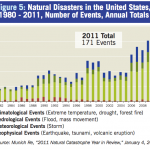Arctic sea ice melt
We are reaching the point where Arctic Sea ice tends to max out, in terms of extent (I will not be talking about volume here, though that is vitally important). Using data provided by the National Snow and Ice Data Center, I ran an informal "Science by Spreadsheet" analysis and came up with a prediction for the minimum extent of sea ice this year, which would be some time in September.
This is mostly a seat of the pants analysis and don't take it too seriously, but feel free to put your bets in the comments section.
The data over the last few decades shows a generally declining extent of…
We call it "weather whiplash." This is not just meteorologists being funny. It is a phenomenon that perhaps has always been with us to some degree, but that has recently become much more common, apparently. If you were under the impression that there is a lot of strange weather going on out there, you may be right, and weather whiplash may be the phenomenon you've noticed. Importantly, there is good reason to believe that weather whiplash is the result of anthropogenic global warming. In other words, it's your fault, so please do pay attention.
Weather patterns tend to move…
Earlier in the northern summer, it looked like the rapid melt of Arctic Sea ice we've been seeing over the last several years was happening again, but rather than being a record year, it was merely tracking along the lower side of the distribution of the long term average. Last year, in contrast, the amount of sea ice hit an all time low early in the year and then broke previous records into tiny icy pieces.
One of the reasons last year's ice melt was so dramatic is that an early storm churned up the ice and got melting going a bit early.
This year, there was no early churning up event,…


